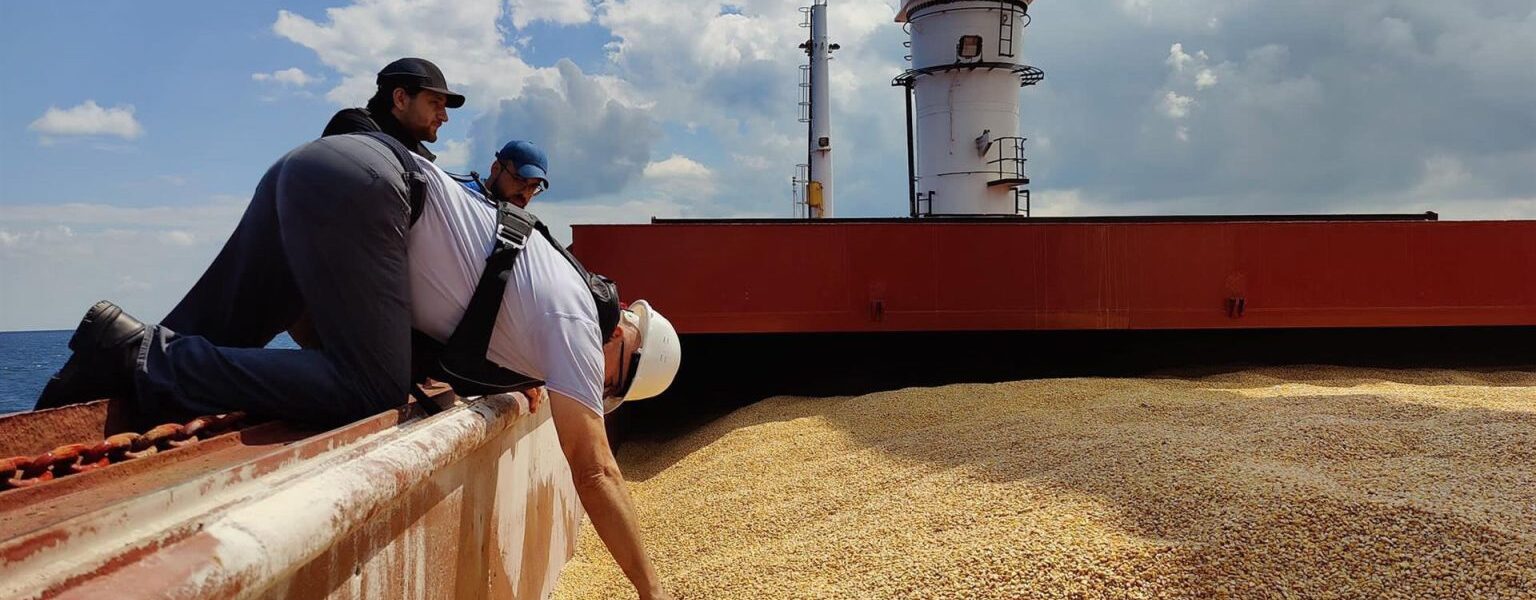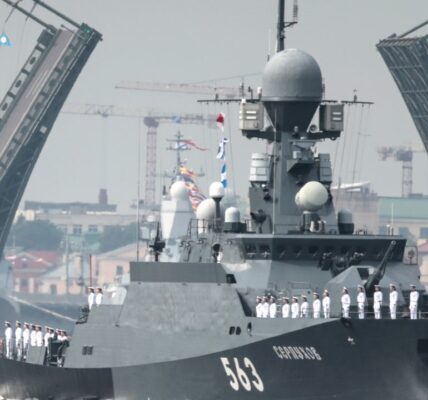Ukraine is intensifying its engagement with Africa through the expansion of its grain exports and the establishment of new embassies across the continent. A crucial aspect of this outreach involves inviting journalists from Africa to visit Ukraine.
Addressing a group of journalists in Kyiv, Ukraine’s Special Envoy for the Middle East and Africa, Maksym Subkh, highlighted that many in Africa may not fully comprehend the extent to which millions across the continent depend on Ukrainian food and grain supplies. Facilitated by the World Food Programme, he said, this assistance extends to countries like Sudan, where the Kyiv government is providing 25,000 tonnes of grain as part of its ‘Grain from Ukraine’ charitable programme.
Furthermore, the Kyiv government is expanding its grain exports to include Southern African countries such as Mozambique and Malawi. Mr Subkh emphasised that Ukraine’s support for Africa goes beyond grain exports, encompassing expertise sharing on enhancing soil fertility and increasing crop yields for various produce including potatoes, vegetables, and fruits. He stressed that Ukraine never weaponized food.
In an effort to counter Russia’s growing influence on the continent and increase Ukraine’s influence, the Ukrainian government has also opened new embassies in Côte d’Ivoire, Ghana, Rwanda, Botswana, Mozambique, and the Democratic Republic of the Congo. These additions complement Ukraine’s existing embassies in Algeria, Angola, Ethiopia, Egypt, Kenya, Libya, Morocco, Nigeria, South Africa, Senegal, and Tunisia. Mr. Subkh also disclosed plans to open more embassies soon, with Sudan, Tanzania, Mauritania, and Cameroon among the targeted countries. – Linda van Tilburg
Video content: Courtesy of Business Day TV.
Edited Excerpts:
Commitment to Global Food Security: Ukraine Exporting 4 Million Tons of Grain to Africa
After last year, we were successful in organising the second summit of the Grain from Ukraine initiative. This program serves as an important signal, sending a clear message to the world that Ukraine was, is, and will remain a stable and reliable guarantor of global food security. Last year, we dispatched more than seven vessels to various African countries. With the assistance of the World Food Programme, millions of people across Africa received grain from our country. By doing so, we are not only informing African nations but also reminding all our partners that without Ukraine, global food stability would not be possible. Ukraine’s intervention and provision are essential to preserving mankind and ensuring food security for numerous African nations.
We are committed to expanding this initiative. Currently, we are engaging in intensive consultations and negotiations with the United Nations World Food Programme and a large number of donor countries that participated in both summits. I would like to take this opportunity to invite more countries, including African nations, to join this initiative. Our aim is not only to involve donor countries but also recipient countries, those in dire need of grain and food
Ukraine Broadens Grain Deliveries Across Africa
We have already delivered grain to Somalia, Sudan, Ethiopia, and Kenya. We are now expanding our supplies to include more countries. Among them are Mozambique, Malawi, the Democratic Republic of Congo, Mauritania, and many others. However, organising each shipment requires considerable effort and time. Since Russia withdrew from the Black Sea Red initiative, Ukrainian exporters and agriculture companies have faced obstacles in freely exporting and delivering supplies to Africa. Our program extends beyond Africa to parts of Asia and Latin America. Unlike Russia, we do not use food as a weapon; instead, we seek to provide unhindered grain supplies to those in need.
Before the Russian aggression against Ukraine, many African countries were unaware of their dependence on Ukrainian food supplies. This realisation underscored that food should not be used as a weapon. Thanks to the alternative corridor established under President Zelensky’s instructions, with the assistance of neighbouring European countries, we have opened the Eternity’s Black Sea Corridor. This corridor serves as the main gateway for Ukrainian ships to bypass Russian-blocked ports on the Black Sea and deliver grain to their destinations. We categorically reject politicising the issue of grain distribution. Our objective is to help those in need, as identified by the United Nations list of countries experiencing food crises. Our initiative supports Ukrainian farmers, continues our strong tradition of export, and serves as a humanitarian effort, reaffirming Ukraine’s commitment to global food security.
Food Will Not Be Weaponised
So, we don’t use grain as a weapon against countries, rewarding or punishing based on their voting decisions. Unlike Russia, our approach is not about leveraging food as a tool of coercion.
If you examine the list of countries to which Russia has recently supplied grain, you’ll notice that all of them have direct ties to the Russian regime and government. Russia’s actions in these countries involve propaganda and destabilisation, supporting regimes that have come to power through unconstitutional means, particularly in the Sahel region. Once again, our program is not intended to weaponize grain; it is categorically aimed at ensuring global food security.
The benefits of our initiative are manifold. Firstly, we support our farmers and bolster our agricultural sector, helping them navigate through challenging circumstances. Additionally, it paves the way for new avenues of cooperation, as we have already experienced.
Ukraine’s Vision for Africa: Beyond Raw Materials, Embracing Joint Ventures and Agricultural Development
On several occasions, we have stated that Ukraine does not wish to confine itself solely to supplying raw materials, as we have done throughout the last three decades. Instead, our aim is to establish joint ventures within Africa and invest in Africa. This represents an initial foray into African investment, as when we supply grain to these countries, the people there discover the opportunities and possibilities that Ukraine can offer. We are particularly interested in developing the agricultural sector in many African countries that are in dire need. Many African partners are urging Ukraine to have a physical presence on the ground, with Ukrainian companies contributing to the development of their agricultural sectors. Considering Ukraine’s legacy in this sphere, particularly in agriculture, I believe we will explore these opportunities in the near future.
Entering markets that have not traditionally been our focus and where Ukrainian companies are not well-known presents a challenge.
Ukraine has much to offer African countries, including a wealth of ideas related to assembling agricultural machines, which are in high demand across the continent. Moreover, we can engage in discussions about methods to enhance soil fertility, especially in arid regions, drawing upon our expertise and experience in areas like the Kherson and Mykolaiv regions of Ukraine. Our knowledge in this field can prove invaluable in tackling the challenges of soil fertility in these environments. Additionally, we are well-equipped to introduce agricultural technologies and solutions aimed at increasing crop yields, encompassing a wide range of produce such as potatoes, various vegetables, fruits, and more.
In Ukraine, we have advanced technology, experienced scientists, and institutions like the Academy of Sciences dedicated to potato cultivation. This institution is unique and holds significant potential to offer valuable insights and support to African companies. If you’re not scheduled to meet with the Ministry of Agrarian Policy of Ukraine, we can facilitate connections with them to provide further ideas and assistance in this domain.
Opening New Embassies Opened to Foster Political Dialogue
Our goal as a ministry is to establish a consistent political dialogue with Africa, starting from the African Union as the gateway to Africa, and extending to specific African capitals where we intend to establish embassies this year.
Ukraine has decided to establish ten new embassies in Africa. Within approximately one month, the Ukrainian flag will be raised at least six new embassies across the continent. Having these embassies on the ground will allow us to enhance our trade and economic cooperation in various sectors.
We have heard repeatedly from various African officials that to truly engage in business with them and assist their economies in growing and becoming more resilient, we must be present on the ground and demonstrate what we can offer. We have taken this message to heart and have decided not to delay, but rather to expedite our efforts to establish these embassies in record time.

























































































































































































































































































